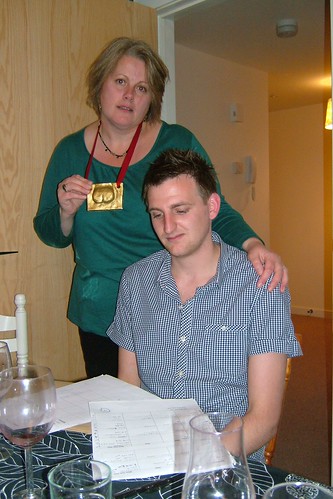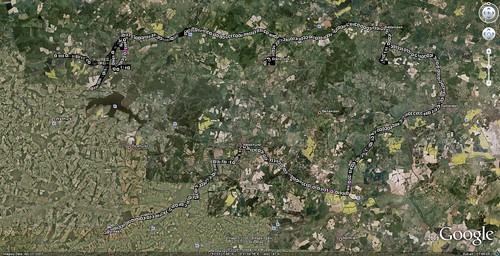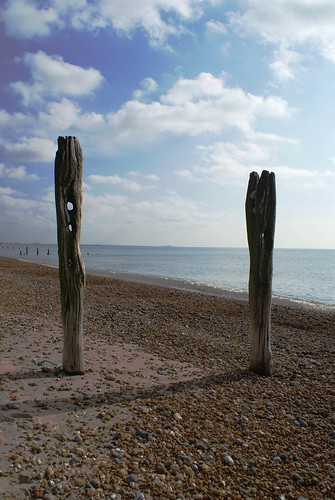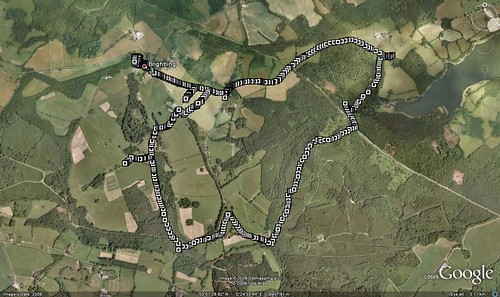First up, her favourite novel as a Penguin-style mug ...

Next, ripping off the local artist Tina Bird Wallbridge to make a stylised map of our local neighbourhood ...

Despite the title, this blog has a low quotient of both strange news and plankton. In reality, this blog is simply a means for me to record my thoughts, musings and bitterness in a crisp ASCII format. I should confess, however, that I do have a professional connection to plankton ...


One of the aspects of science presentation in the media that I find most annoying is the inconsistency in the reporting.
A short while ago, I heard Justin Webb questioning David King on the veracity of climate science, and again muddying the waters of a settled area of science ("settled", obviously, in the scientific community).
But earlier in the programme I heard the Today panel cooing over some clearly erroneous "science" about dancing in humans. Thankfully, I'm no expert in "dance science", but even an oceanographer can spot a number of serious flaws in the reported work, flaws that the Today team were either oblivious to, or quite happy to ignore for the sake of a story.
For starters, the data originate from a self-selected sample so are not representative, and are (I believe) UK specific so may not translate between cultures. Which, needless to say, didn't stop the interviewee from extrapolating wildly to the whole of humanity. This dubious data was then used in an evolutionary flight-of-fantasy in which the interviewee first confidently tacked on some faintly plausible relationship with fertility, but then went off at the deep end by positing an explanation for older male dancing that drew on discredited group selection theory.
To wit, any older male "stepping aside" for younger males would be at a strong evolutionary disadvantage since they would likely leave less descendants than less accommodating rival males. To be fair, it's conceivable that some variant of kin selection could play a role here, but the Today interviewee blithely played the super-confident expert while peddling his science-lite story.
Such a double standard in reporting is infuriating to scientists. Work that's firmly grounded in vast quantities of data and deep theoretical understanding is pilloried, while work that, to put it charitably, needs more data and better hypothesis-testing gets as much airtime and polite approval from the Today team.
I understand the realities of reporting that place science as just one other story, but Today does its listening public a disservice by failing to properly contextualise the science that it does report. We expect Today to focus on important stories when it comes to the political and economic arenas, why can't it do the same for science?

We, members of the UK science community, have the utmost confidence in the observational evidence for global warming and the scientific basis for concluding that it is due primarily to human activities. The evidence and the science are deep and extensive. They come from decades of painstaking and meticulous research, by many thousands of scientists across the world who adhere to the highest levels of professional integrity. That research has been subject to peer review and publication, providing traceability of the evidence and support for the scientific method. The science of climate change draws on fundamental research from an increasing number of disciplines, many of which are represented here. As professional scientists, from students to senior professors, we uphold the findings of the IPCC Fourth Assessment Report, which concludes that "Warming of the climate system is unequivocal" and that "Most of the observed increase in global average temperatures since the mid-20th century is very likely due to the observed increase in anthropogenic greenhouse gas concentrations".Although I am one of the almost 2000 signatories, I did think twice about signing up, and communicated this in my response to the initial request for support. Not, I should add, because I in any way disagree with or have qualms about the statement, but because it's not clear to me what the best course of action is when dealing with the toxic morass created by so-called climate skeptics [*].
 The novel tells the story of Eilis, a young woman living with her mother and older sister, Rose, in south-east Ireland in the 1950s. Struggling to find work at home, Eilis is offered a job in America through a family priest, a job that she clearly has to take. Apprehensive at first, then strongly homesick later, Eilis travels on her own to an alien New York where she becomes a shop assistant in an Italian department store in Brooklyn. Gradually, she finds her feet, both at work and in her new life in the United States. She's helped along the way by an attentive employer at work, a gruff but kind-hearted landlady and the watchful gaze of her Irish priest. This support, together with her own tenacity, slowly transforms Eilis from a shy wallflower to a more confident young woman, at ease in her night classes and on the dance floor at her parish church. At the latter she meets Tony, an Italian American who, after an extended courtship, she falls in love with. But an unexpected death back in Ireland forces Eilis to part from Tony and return, ostensibly briefly, to her old life. This visit confronts Eilis with the changes that America has wrought in her through the new esteem in which she finds herself held. Having left dowdy, she has returned sophisticated and exotic, and attracts the attention of a successful local man. Hesitant in telling her family of her relationship with Tony, and tempted by the possibility of unexpected romance in Ireland, Eilis allows herself to be swept along into the arms of this new suitor. But Eilis cannot keep her two lives separate and choosing between them is inevitable.
The novel tells the story of Eilis, a young woman living with her mother and older sister, Rose, in south-east Ireland in the 1950s. Struggling to find work at home, Eilis is offered a job in America through a family priest, a job that she clearly has to take. Apprehensive at first, then strongly homesick later, Eilis travels on her own to an alien New York where she becomes a shop assistant in an Italian department store in Brooklyn. Gradually, she finds her feet, both at work and in her new life in the United States. She's helped along the way by an attentive employer at work, a gruff but kind-hearted landlady and the watchful gaze of her Irish priest. This support, together with her own tenacity, slowly transforms Eilis from a shy wallflower to a more confident young woman, at ease in her night classes and on the dance floor at her parish church. At the latter she meets Tony, an Italian American who, after an extended courtship, she falls in love with. But an unexpected death back in Ireland forces Eilis to part from Tony and return, ostensibly briefly, to her old life. This visit confronts Eilis with the changes that America has wrought in her through the new esteem in which she finds herself held. Having left dowdy, she has returned sophisticated and exotic, and attracts the attention of a successful local man. Hesitant in telling her family of her relationship with Tony, and tempted by the possibility of unexpected romance in Ireland, Eilis allows herself to be swept along into the arms of this new suitor. But Eilis cannot keep her two lives separate and choosing between them is inevitable. This time the novel is set, unusually, outside of both Edinburgh and Scotland. Rebus has been called to London to assist a stumbling investigation there into a potential serial killer, dubbed the "Wolfman" by the popular press. Ostensibly there because of his experience in an earlier case (one that's pre-novels I think), Rebus suspects that he's been brought in only temporarily, to take the heat off the local investigators and to potentially serve later as a scapegoat. However, much as hoped by his London opposite number Detective George Flight (and expected by loyal readers), Rebus' fresh eyes and Scottish experiences take the investigation in new directions. Assistance from an attractive, if strangely office-less, female psychologist gives Rebus both a new perspective on the killer, but also an Achilles' heel.
This time the novel is set, unusually, outside of both Edinburgh and Scotland. Rebus has been called to London to assist a stumbling investigation there into a potential serial killer, dubbed the "Wolfman" by the popular press. Ostensibly there because of his experience in an earlier case (one that's pre-novels I think), Rebus suspects that he's been brought in only temporarily, to take the heat off the local investigators and to potentially serve later as a scapegoat. However, much as hoped by his London opposite number Detective George Flight (and expected by loyal readers), Rebus' fresh eyes and Scottish experiences take the investigation in new directions. Assistance from an attractive, if strangely office-less, female psychologist gives Rebus both a new perspective on the killer, but also an Achilles' heel.


 That said, I suspect it's not the most typical of introductions to the literary genre for a couple of reasons. Firstly, it's written (rather than ghostwritten) by someone with an atypical job relative to most public figures who come to my attention, namely one in popular music. Secondly, although the subject is an artist, the book contains practically nothing about his art. This came as something of a surprise, and I suspect some readers might feel a bit cheated to find the book's pages bereft of anything about their favourite music beyond vague, passing remarks.
That said, I suspect it's not the most typical of introductions to the literary genre for a couple of reasons. Firstly, it's written (rather than ghostwritten) by someone with an atypical job relative to most public figures who come to my attention, namely one in popular music. Secondly, although the subject is an artist, the book contains practically nothing about his art. This came as something of a surprise, and I suspect some readers might feel a bit cheated to find the book's pages bereft of anything about their favourite music beyond vague, passing remarks.





























